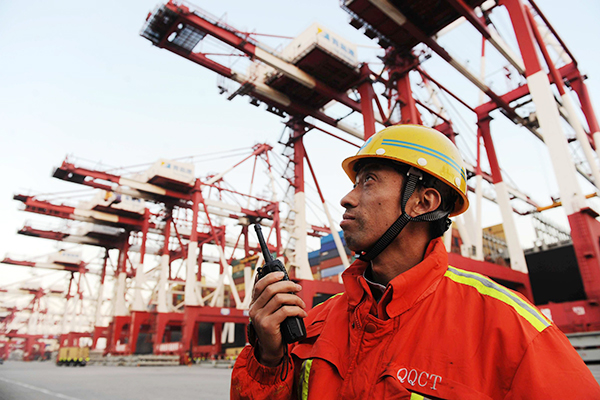US will lose if it starts a trade war with China
 |
|
A worker looks closely as containers are unloaded in Qingdao Port, Shandong province. [Photo/China Daily] |
During his election campaign, US President Donald Trump threatened to impose 45 percent tariffs on Chinese imports to force China into renegotiating its trade balance with the United States. The immediate result of that would be a fierce trade war that the US would almost certainly lose. And while we don't know yet whether Trump will follow through with this threat, his abandonment of the Trans-Pacific Partnership agreement in his first few days in office is an indication that he is not shying away from his campaign pledges.
For the moment, China has decided to wait for the US to make the first move. A trade war would be problematic for the Asia-Pacific region, not least for Southeast Asia, which would be most likely to suffer the negative fallout as a major trade partner of both the US and China. But it would not be a disaster for China, mainly because the US needs China more than vice-versa.
Unfortunately for Trump, it's not the 1980s anymore. Three decades ago, the situation might have been different. China was underdeveloped, and it wanted access to manufacturing technologies. China has most of what it needs now, and what it doesn't have it can easily obtain from vendors outside the US. While the US market looked enticing a few decades ago, it is relatively mature, and today the newer emerging market economies have become much more interesting to Beijing.
The fastest growing markets for the best items China produces, like laptops and cellphones, are in developing regions such as India, and Latin American and African countries.
And China is a market that the US can hardly ignore. By the end of 2015, Chinese consumers had bought about 131 million iPhones. The total sales to US customers during the same period stood at 110 million. Apple's iPhone sales in China are running into competition from local Chinese manufacturers. And iPhones are only a small part of US exports. Boeing, which employs 150,000 workers in the US, estimates that China will buy some 6,810 airplanes over the next 20 years, and that market alone will be worth more than $1 trillion. Likewise, the Chinese would happily shift their trillion dollars in future aircraft purchases to Airbus, a European company that is already building a plant in China to assemble large, twin-aisle jets. As for automobiles, most Chinese would just as soon drive a Mercedes, BMW or Lexus as a Ford.
Were Trump to start a trade war, the most immediate effects would probably be felt by companies like Walmart that import billions of dollars of cheap goods that are bought mostly by the people who voted Trump into office. The prices of almost all of these items would quickly skyrocket beyond the reach of the lower economic brackets-not because of manufacturing costs, but because of the tariffs. The result would be an economic war of attrition that China is infinitely better positioned to win.
China's foreign currency reserves now stand at just below $3 trillion. In contrast, the US has foreign exchange reserves that hover at around $120 billion. Trump's tariffs would automatically trigger penalties against the US in the World Trade Organization, which would lead to higher tariffs against US exports.
The US political system is relatively mature with checks and balances, but with a president who often acts uniquely based on his own beliefs regarding complex issues, almost anything is possible.
While it might take a while for that to happen, the turmoil would be catastrophic for American businesses and employment. China, on the other hand, would emerge relatively unscathed.
The author is the regional director of Southeast Asia and Oceania for IMD business school.
















